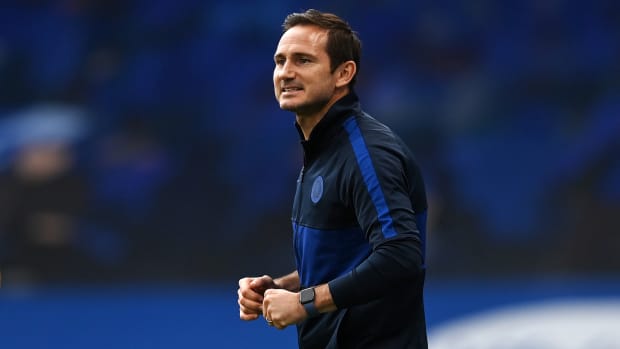Considering the circumstances and stakes, it was a hugely successful season for Chelsea–but it wasn't without some significant faults. If Frank Lampard's project is to progress, there are some genuine needs-improvement areas to address.
In his first season as a manager in the Premier League, Frank Lampard overcame the loss of Eden Hazard and a transfer ban to lead his side to fourth place and Champions League qualification. Chelsea will also play in Saturday’s FA Cup final. In some ways this has been a hugely successful season. A number of young players having been blooded, Christian Pulisic looks hugely promising on the heels of his post-restart form, and with Timo Werner and Hakim Ziyech–and possibly Kai Havertz, too–all set to arrive, the future ostensibly appears bright.
But there are some questions. Chelsea did finish third last season, picking up six more points than it did this season, as it finished fourth. It also won the Europa League and took Manchester City to penalties in the League Cup final last season. There is a strange dissonance between the celebration of Lampard and the widespread frustration felt with Maurizio Sarri. The argument was always that Sarri's football was stodgy–and that is true, up to a point, although it was remarkable how quickly the preseason talk of patience with a manager attempting a revolution was forgotten. It’s hard to avoid the conclusion that different standards are applied to a young English manager who plays the media game well and a grumpy Italian whose every press conference oozed resentment.
None of that invalidates what Lampard has achieved. Chelsea's football has often been attacking and exciting, and his switch to a back three and the pressing of Willian and Mason Mount were at least partly responsible for Manchester United’s insipid showing in the FA Cup semifinal.
There are still some major concerns, though.
Most obviously, there is the defense. Chelsea conceded 54 league goals, more than anybody else in the top half, and only one short of its worst season defensively in the Premier League ever. In part, that is down to the miserable form of Kepa Arrizabelaga, still the most expensive goalkeeper in history. He stopped a lower proportion of shots on target this season than anybody other goalkeeper since Opta began collecting the data in 2003. Lampard, perhaps not surprisingly, lost patience and fielded Willy Caballero on the final day of the season, and a bid for a new keeper seems likely, even if the possibility of recouping anything like the $90 million paid for Kepa is remote.
But it’s not just the number of goals, it’s the type of them. Only Norwich and Aston Villa conceded more goals from crossed set plays. After West Ham had rattled Chelsea from a series of corners, Lampard lamented the lack of height in his back four. Perhaps there is something in that–none of Antonio Rudiger, Andreas Christensen, Kurt Zouma or Fikayo Tomori is especially commanding–and it would be a surprise if there is not at least one major arrival at center back and probably also at left back.
No side, meanwhile, conceded so many goals to fast counters as Chelsea. Again, the issue of personnel can be raised. Jorginho has never really impressed in Chelsea blue, while N’Golo Kante has suffered his worst season in England, which may in part be related to the legal action he’s involved with in France. But then again, Lampard's Derby County conceded a higher proportion of goals on the counter than any other side in the second-tier Championship in 2018-19, suggesting the issue is structural.
And that’s the biggest worry: defending set plays and counters is largely a matter of consistent drilling on the training ground. To fail at both raises obvious concerns about coaching, and that can only be Lampard’s responsibility.

The other issue is one of personality. Lampard seems unusually thin-skinned for a manager. When Raheem Sterling raised the issue of his rapid elevation to the Chelsea job, Lampard bridled and insisted he had “worked hard.” He undoubtedly has, but the response seemed oddly to miss the context of the wider conversation about the racial structures of English football. More trivially, his anger at Liverpool’s coaching staff for supposedly breaching “the code” during their recent league game was a reminder of the Spygate nonsense of last season, when Lampard seemed inordinately aggravated by the breach of some unwritten theory of behavior of which only he was aware.
Perhaps he is simply very sensitive to issues of respect and decency, in which case playing under Jose Mourinho for so many years must have been a dreadful ordeal; however, other managers may look at that and think he is a manager who can be provoked.
This has been a promising first Premier League season for Lampard in certain respects, but it's clear there are also obvious improvements to be made.